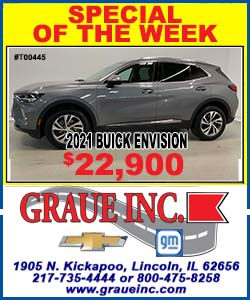Global automakers say Trump's tariffs will be painful for them and US
consumers
[March 28, 2025] By
DAVID McHUGH, LORNE COOK, AAMER MADHANI and DANICA KIRKA
FRANKFURT, Germany (AP) — Whatever the U.S. gains from President Donald
Trump's 25% tax on imported cars – and experts are skeptical –
automakers around the world are bracing for a lot of pain.
In Japan, South Korea, Mexico, Canada and across Europe, automakers
employ millions of people whose livelihoods depend on buyers in the U.S.
that currently spend more than $240 billion annually on imported cars
and light trucks.
The Trump tariffs — aimed at boosting U.S. jobs and tax revenues — will
also affect imported auto parts, which were valued last year at $197
billion.
“The impact will be really huge and very disruptive,” said Sigrid de
Vries, director general of the European Automobile Manufacturers’
Association. Vries and others critics say American car shoppers will
also be worse off, as tariffs push prices higher.
Policymakers around the world said Thursday they were weighing their
next moves — namely, whether to retaliate or not, and if so, how. But
they also expressed hope that negotiations with Washington could avert
an escalating trade war, and the economic damage and global supply chain
disruptions that would come with it.
Trump said the U.S. would begin collecting tariffs on autos on April 3.
The impending hit comes on top of other U.S. tariffs planned globally on
steel and aluminum, and at a time when competition from China, and the
transition to electric vehicles, is already pressuring automakers.

The anticipated blow knocked down the stock prices of many major
automakers on Thursday, including Toyota, Mercedes-Benz, Kia and BMW.
U.S. carmakers are less exposed to possible retaliation because they
export only 2% of their production to the EU. Still, shares of Ford and
General Motors fell because the U.S. industry relies heavily on
cross-border trade in auto parts — although Tesla is an exception and
its stock price rose on Thursday.
Most foreign carmakers have plants in the U.S. -- Japanese carmakers
have two dozen, for example. But that would not shield them if they use
imported parts, unless those parts are exempted under a free-trade
agreement with Mexico and Canada.
The auto tariffs will be felt sharply in Europe, for whom the U.S. is
the biggest export market for an industry that supports nearly 14
million jobs.
The EU’s top trade official, Maros Sefcovic, has traveled to Washington
at least twice since Trump was reelected to try to engage the
administration. But Trump says the tariffs, which his administration
estimates would raise $100 billion in revenue annually, are “permanent.”
The White House has claimed they will foster domestic manufacturing.
“This will continue to spur growth,” Trump told reporters Wednesday upon
announcing the tariffs.
The head of the United Auto Workers, Shawn Fain, thanked the White House
“for stepping up to end the free trade disaster that has devastated
working class communities for decades.”
The U.S. president on Monday cited plans by South Korean automaker
Hyundai to build a $5.8 billion steel plant in Louisiana as evidence
that tariffs would bring back manufacturing jobs.
Economists say the tariffs will only raise costs that will be passed on
to consumers and lead to a cycle of retaliation that will reduce trade
between countries.
“There’s a risk of retaliatory tariffs and then a tit-for-tat, and then
we end up with significant barriers to trade and we all lose out,” said
David Bailey, professor of business economics at the University of
Birmingham. “That’s the fundamental problem here, essentially that
governments will start to retaliate against each other.”
Trump has already placed a 20% tax on all imports from China for its
role in the production of fentanyl. He similarly placed 25% tariffs on
Mexico and Canada, in part to pressure them to help reduce illegal
immigration to the U.S. And he has imposed 25% tariffs on all steel and
aluminum imports — and said he plans tariffs on computer chips,
pharmaceutical drugs, lumber and copper.

[to top of second column] |

President Donald Trump waves after speaking at a reception
celebrating Women's History Month in the East Room of the White
House, Wednesday, March 26, 2025, in Washington. (AP Photo/Mark
Schiefelbein)
 Before the new auto tariffs were
announced, the EU had been planning to re-impose suspended tariffs
in mid-April on a range of U.S. goods, including jeans, bourbon and
motorcycles, as part of a previous dispute over trade in steel and
aluminum.
“We have our plans ready," said EU foreign affairs representative
Kaja Kallas. But she said there is still uncertainty about which
tariffs Trump will follow through on, and which can be resolved
through negotiations.
Japanese Prime Minister Shigeru Ishiba on Thursday reiterated a
request that his country's automakers be exempted from Trump's
tariffs. When asked about possible responses, he said “all options”
are on the table, without giving specifics.
The union that represents auto workers in Canada lashed out at
Trump’s decision, and called on their prime minister, Mark Carney,
to retaliate if necessary. Carney said he and Trump would be
speaking in coming days.
“We have never seen an attack like this but we are ready,” said Lana
Payne, the National President of Unifor. She said Carney should tell
Trump that if U.S. automakers are going to sell cars and trucks in
Canada they are going to have to build in Canada.
Autos are Canada’s second largest export, and on Wednesday — before
Trump made his announcement — Carney unveiled a $2 billion Canadian
($1.4 billion) “strategic response fund” that will protect Canadian
auto jobs affected by the tariffs.
For now, international auto companies are reluctant to make
expensive operational changes, such as adjusting supply chains or
relocating more production to the U.S., since it is still possible
the tariffs will be withdrawn by Trump if they cause too much
economic pain for Americans, according to analysts at the Sanford C.
Bernstein research firm.
“Despite claims that the tariffs would last for Trump’s full term,
we think it is unlikely that the new tariff regime will last, given
the wide-spread damage they will do across industries and the
inflationary impact on the US economy,” they wrote. They pointed out
that the last tariff escalation between the U.S. and China impacting
autos only lasted from July to December 2018, during Trump's first
term in office.

The 25% tariffs — if kept in place over the long-term — could add as
much as $12,000 per imported vehicle purchased in the U.S.,
Bernstein analysts estimate. Of course, carmakers will ultimately
determine how much of the Trump tariffs to pass along to consumers,
as opposed to taking the hit in their profit margins.
The blow will not fall evenly. The most exposed among European
automakers are German and Italian carmakers. Japan and South Korea
are also major exporters, while Canada and Mexico are deeply
integrated into U.S. carmakers' supply chains.
Europe’s carmakers already face a shrunken domestic market and new
competition from cheaper Chinese electric vehicles. Any trouble in
the auto industry would weigh on Europe's economy, which did not
grow at all in the last quarter of 2024.
“This would deliver a substantial blow to a sector that not only
sustains millions of jobs but also contributes to a large proportion
of the bloc’s GDP,” wrote analyst Clarissa Hahn at Oxford Economics.
——
Madhani contributed from Washington and Cook from Brussels. AP
reporters Geir Moulson in Berlin, Karel Janicek in Prague, Alexander
Vershinin in Ashgabat, Turkmenistan and Yuri Kageyama in Tokyo also
contributed.
All contents © copyright 2025 Associated Press. All rights reserved |